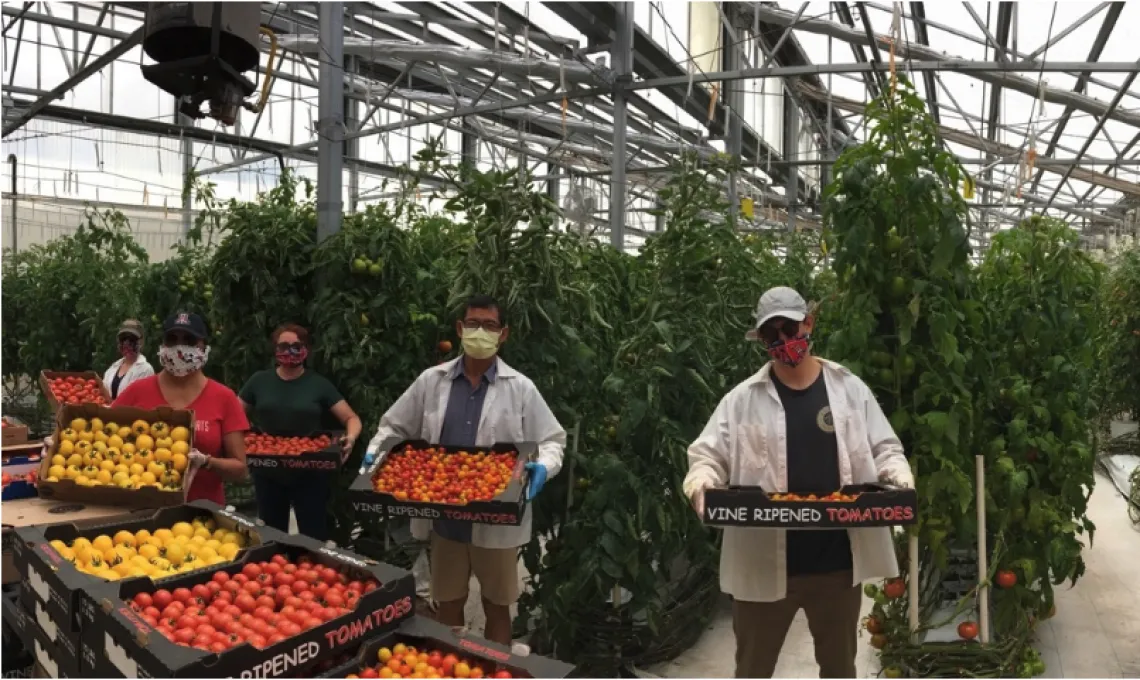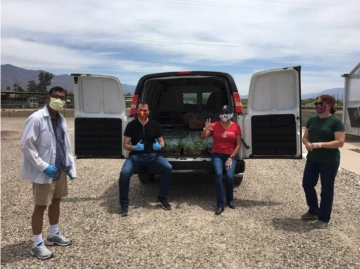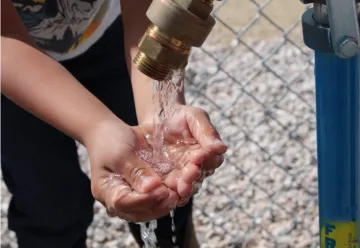Indige-FEWSS partners with the Navajo Nation in COVID-19 response

The relationships developed through the Indige-FEWSS partnership with Diné College and Navajo communities has allowed UArizona faculty and students to provide expert advice, technology and donations to support Navajo resiliece during the pandemic.
Food, energy and water (FEW) insecurities have been amplified on the Navajo Nation during the COVID-19 pandemic. The Navajo Nation is a rural food desert with only 13 grocery stores across the 25,000 square miles of remote terrain for a population of nearly 200,000 tribal citizens. This is approximately 8 people/sq.mi. Furthermore, nearly 30% of remote Diné (Navajo) homes lack running water and 40% lack electricity. The Diné people haul water 5-50 miles away incurring an enormous expense of $13.30 per 100 gallons in comparison to 40 cents in a nearby city. Community resilience is critical for Diné communities to respond to and recover from perturbations such as pandemics and disasters. Developing technical solutions to these challenges requires an understanding of Indigenous societies, governance, and culture and the ability to work effectively in these contexts.

Karen Francis Begay, Assistant Vice Provost of Native American Initiatives, drove the produce to Window Rock herself.
Since 2017, the University of Arizona (UArizona) has been working in partnership with Diné College towards our vision to develop a diverse workforce with intercultural awareness and expertise in sustainable food, energy, and water systems (FEWS), specifically through the design of fit-for-purpose water and controlled environment agricultural (CEA) technologies to address the lack of safe water, energy, and food security in Indigenous communities. Each year, the UArizona Indige-FEWSS has conducted summer trainings for tribal college students; spring break immersion trips with UArizona students to learn about the Navajo Nation government, people, and culture; hosted Diné College for summer research opportunities; and held trainings and outreach for Navajo communities.
The team at the Controlled Environment Agriculture Center donated 900 pounds of fresh tomatoes and lettuce to the Navajo Nation in April 2020. Dr. Murat Kacira, director of the CEAC and co-PI of Indige-FEWSS, worked with Karen Francis Begay, Assistant Vice Provost of Native American Initiatives, to make the donation. Ms. Francis-Begay drove the produce to Window Rock herself.
In May 2020, the Navajo Nation Council on Natural Resources and Nabikiyati Committees invited Dr. Karletta Chief and the Indige-FEWSS team to present on the off-grid FEW technologies being developed with Diné College as a possible solution to address lack of water access during the COVID-19 pandemic.
Dr. Karletta Chief led a campus effort to respond to the needs of the Navajo Nation and the UArizona Navajo-COVID-19 working group wrote an executive summary listing the areas of expertise the UArizona has to respond to Navajo COVID-19 needs. The UArizona Haury Program in Environmental and Social Justice awarded Dr. Karletta Chief a Haury Program Director’s Award for Graduate Student Support of $18K” to hire student support and Indige-FEWSS Trainee Nikki Tulley (Diné) was hired to oversee this effort.
PhD candidate, Nikki Tulley explains, “The great outreach and response to the Navajo Nation during the time of the COVID-19 Pandemic has been really awe-inspiring to witness. I appreciate the opportunity to be part of the Navajo COVID-19 UArizona response team made up of numerous faculty, staff, and students coming together in a respectful way, consulting with the Navajo Nation every step of the way to make sure the efforts were aligned with what they needed. Working with tribal leadership and tribal employees has been a great resource and reminder just how important tribal consultation is when it comes to collaboration and communication. It has also been amazing to see the Navajo expertise and tireless effort members of the nation have displayed during this time of the pandemic.”

Several members of the Navajo COVID-19 Water Needs Data Mapping project and Solar Nano-Filtration Purification Unit project have attended the Navajo Nation Water Access Coordination Group Meetings that focused on creating Temporary Watering Points all across the reservation to provide locations of drinking water to be brought closer to Navajo residents lacking potable water in their homes.
Through many bi-lateral communications of tribal consultation, the Navajo Nation Deputy Chief of Staff invited Indige-FEWSS to join the Navajo Nation Water Access Coordination Group (WACG). The mission of WACG is to identify, acquire, prioritize, and use available resources to increase access to quality water for tribal homes. The WACG is using available data to identify and design interventions to guide the mission. WACG consists of Navajo Nation departments, enterprises, federal and state agencies, universities, and non-profits. The UArizona Indige- FEWSS assisted in input of health messaging, water quality, data analysis, and potential for off- grid FEW technologies. Indige-FEWSS formed multi-institutional collaborations to address water quality of Navajo waters and piloting off-grid water technologies. This multi-university collaborations included University of New Mexico, Montana State University Billings, Northern Arizona University, Southwest Research and Information Center, University of California Los Angeles, Riley Engineering, Dig Deep, Native Renewables, Navajo Nation Water Management Branch, Navajo EPA, NTUA, and Diné College. Through tribal consultation and tribal approval process, UArizona obtained Navajo support letters and Navajo tribal government resolutions. Indige-FEWSS sought to obtain funding to support these collaborative efforts. As a result, four grants were awarded to work with the Navajo Nation on FEWS challenges amplified during the COVID-19 pandemic. We are thankful to UArizona Haury Program in Environmental and Social Justice and the National Institute of Environmental Health Sciences.
1) “Haury Program Director’s Award for Graduate Student Support-$18K” overseen by Dr. Karletta Chief and hired Trainee Nikki Tulley (Diné).
2) “Navajo COVID-19 Water Needs Mapping-$87K” led by Dr. Karletta Chief with partners at Montana State University-Billings, Northern Arizona University, University of New Mexico, and Southwest Research and Information Center.
3) “Off-grid Water Purification Units-$40K” led by Dr. Vicky Karanikola along with Robert Arnold, Karletta Chief, Kim Ogden, and Kelly Simmons-Potter.
4) “Investigating linkages between arsenic exposure, diabetes, and COVID-19 infections and risks on the Navajo Nation-$384K” led by Dr. Stephanie Carroll (UArizona) and Dr. Jani Ingram (NAU) along with Dr. Karletta Chief (UArizona), Dr. Paloma Beamer (UArizona), and Ricky Camplain (NAU).
“Our community-based work with Diné College over the past 3 years on FEWS challenges prepared us to respond quickly to COVID-19 challenges facing the Navajo Nation.” -Dr. Karletta Chief (Indige-FEWSS PI)
